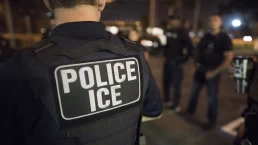The small city has developed a reputation for its robust, coalition-based response to the threats posed to its immigrant community by federal immigration officials.
By Melinda Tuhus, The Progressive
After Donald Trump was elected to a second presidential term in 2024, New Haven’s venerable immigrant rights organization, Unidad Latina en Acción (ULA), began beefing up its support team of local citizens who accompany undocumented immigrants to court appointments while keeping watch in and around the courthouse for U.S. Immigration and Customs Enforcement (ICE) officers. For groups like ULA, court support is an urgently important practice: While previous administrations barred ICE from making arrests at “sensitive locations” such as schools, hospitals, places of worship, and courthouses, Trump issued an Executive Order eliminating that policy immediately after taking office.
But the threat posed to immigrants by the Trump Administration hit particularly close to home one day in March, when, as an ULA team waited in a coffee shop downtown for an ULA member who appeared to be running late for a court date, the group was dismayed to learn that he’d been apprehended by ICE and was on his way to an immigration detention center. He was subsequently deported.

Though New Haven is a small city of 135,000 people, the robust response to Trump’s mass deportation efforts by its government entities, nonprofits, grassroots groups, and immigrant communities has enhanced its reputation as a “welcoming city” that will fight for the safety of all residents, regardless of their immigration status. In addition to New Haven’s ban on police collaborating with ICE, an executive order passed by Elicker directs all city staff, not just police, to decline to cooperate with federal immigration officials on solely immigration-related matters. The resistance efforts have also extended to its largest suburb, Hamden, where the Legislative Council passed an ordinance in late April codifying Mayor Lauren Garrett’s executive order extending protections to its immigrant population.
But as in every city, the path to effectively protecting immigrants is uncertain. “I think it’s early for us to know how things are going—they change dramatically every day,” New Haven Mayor Justin Elicker tells The Progressive. “We’ve retrained all our staff on the Welcoming City Executive Order. We’re doing what we can within the law and within our powers.”
Recent Posts
New Addition to List of Nuclear Near Catastrophes
February 25, 2026
Take Action Now Debris flew for great distances — many times the distance of 270 meters to a nuclear reactor and nuclear storage facility.By David…
Gavin Newsom’s last budget belies his ‘California for All’ pledge
February 24, 2026
Take Action Now Yet, even as the state is poised to lose billions in federal funding, and millions of Californians are losing access to health care…
Israel and American Hawks are Pushing U.S. to Iran War With Catastrophic Consequences
February 23, 2026
Take Action Now At the World Health Assembly in May, member states may endorse an unprecedented strategy declaring that health is not a cost – but…
A Child’s View of the Attack on Venezuela. And a Peace Flotilla
February 23, 2026
Take Action Now Fabricio said that he and his family went out of their building and saw many people also going outside, running around, and kids…




